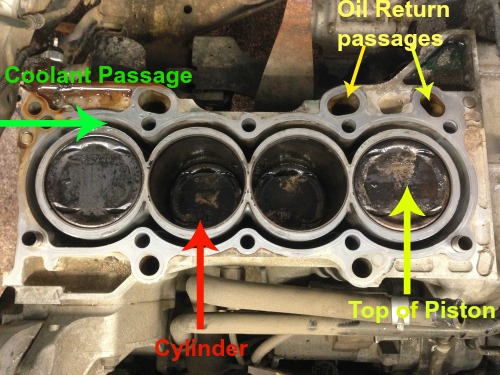
Your cars engine operates in extreme conditions with intense heat. A head gasket failure may be caused by an engine overheating one too many times as a result of a clogged radiator coolant leak faulty fan etc but the blown head gasket can also cause the engine to overheat.

This will result in contaminated oil the white milky sludge or milk shake associated with a blown head gasket and a compromise the cooling system.
What can cause a blown head gasket. What Can Cause a Blown Head Gasket. One of the best ways to prevent a catastrophic head gasket failure is to keep your car at the proper. Warped or Cracked Block or Head.
An engine that has overheated can warp or crack due to the way heat distorts and. Over time the head. Overheating can be caused by a blown head gasket.
The engines heat can get so high that it melts. When the head gasket fails it will allow the coolant to escape once the engine gets hot. Bubbles in the radiator.
If you remove the. Blown head gasket causes. Your cars engine operates in extreme conditions with intense heat.
If this heat becomes more than normal your engine can overheat causing a blown head gasket. The extra heat results in the cylinder head and engine block expanding too much which results in a failure in the head gasket. Common Faults That Can Lead to a Blown Head Gasket 1.
Overheating is perhaps one of the most common causes behind head gasket failures. Not only can an. Preignition or detonation is perhaps about as common as overheating as a source of head gasket.
There are several possible causes including engine age but two common culprits are overheating and preignition issues. When an engine overheats the metal expands and pinches the head gasket so it no longer seals properly. What Causes a Blown Head Gasket.
The head gasket may expand if the engines operating temperature exceeds the normal temperature range for its specification. If the temperature becomes too hot the cylinder head and other metal parts in the engine including the engine block will expand stretching or tearing the head gasket which will be the cause of a leak. First the most common cause of a blown head gasket is overheating.
If your engine is run hotter than it was designed to things will expand further than intended causing both the breakdown of the gasket material and the metal in your engine to warp causing a blown head gasket. The main reason for the blown head gasket is the extremely high temperature emitted from the engine. This high temperature is the result of the coolant leak or not having enough coolant in the radiator another reason if radiator fan motor does not work or cut off the fuse.
Overheating is one of the less-obvious signs of a blown head gasket. Depending on the severity of the leak you may see bubbles in the overflow tank indicating that the cylinder is leaking into the cooling system. Blue exhaust smoke could also indicate head gasket failure but so could worn rings valve stem seals or a faulty PCV system.
If the head gasket fails between an oil gallery and a water passage it will allow the engine oil and coolant to mix. This will result in contaminated oil the white milky sludge or milk shake associated with a blown head gasket and a compromise the cooling system. 4 Compression leak between cylinders.
The biggest cause of a blown head gasket is overheating. Usually the head gasket armor around the cylinders can become crushed and if this happens the seal is lost and your engine will lose compression leak coolant and the gasket will erode. Before replacing the gasket its vital that you find the cause of the overheating.
Allowing your coolant level to run low can cause damage to your head gasket. When coolant isnt available to pull engine heat from your block and heads the extra heat can cause expansion on your head gasket which often results in a blown head gasket. These forces can wear your head gasket out over time and cause it to fail.
Since the head gasket is meant to prevent the mixture of these fluids a blown head gasket could cause this and the results can be catastrophic. Below are three of the most common signs that indicate you have a blown head gasket. 1 Antifreeze Oil Mixture A blown cylinder head gasket can cause oil to mix with the antifreeze fluid.
The first and primary cause for a blown head gasket is engine overheating as we mentioned earlier. As your engine overheats it expands and affects the level of cylinder sealing by the head gasket. This head gasket is not designed to withstand too high temperatures above the operating limit.
A head gasket failure may be caused by an engine overheating one too many times as a result of a clogged radiator coolant leak faulty fan etc but the blown head gasket can also cause the engine to overheat. Bubbles in the Radiator Besides allowing coolant into the combustion chamber an internal head gasket leak allows exhaust gases into the coolant. This can cause bubbles to be in the radiator or coolant reservoir making the coolant look like its boiling even when its cold.
The main cause for a blown or damaged head gasket is extreme engine temperature. High engine temperatures are often caused by a coolant leak or just not having enough coolant in the radiator. It is important to note that different head gaskets will falter at different stages and temperatures.
Head gasket failure occurs when the gasket is no longer able to provide proper sealing between the cylinder head and the engine block. In most cases the head gasket is physically broken allowing the fuel and air mixture to escape the cylinder head. This in turn causes the engine to lose power and torque.